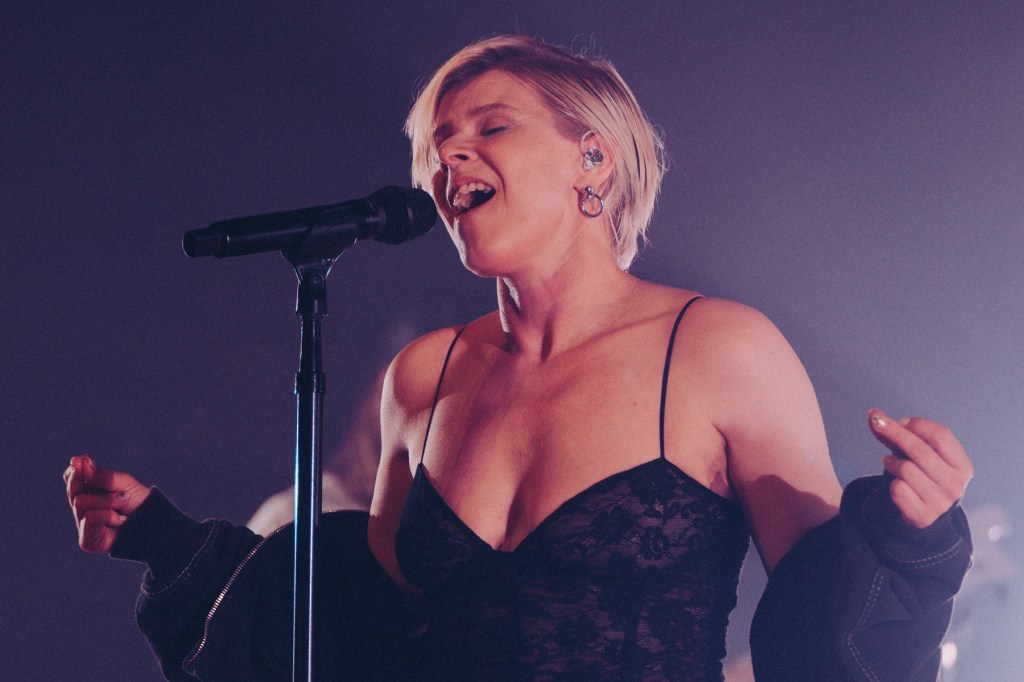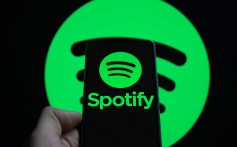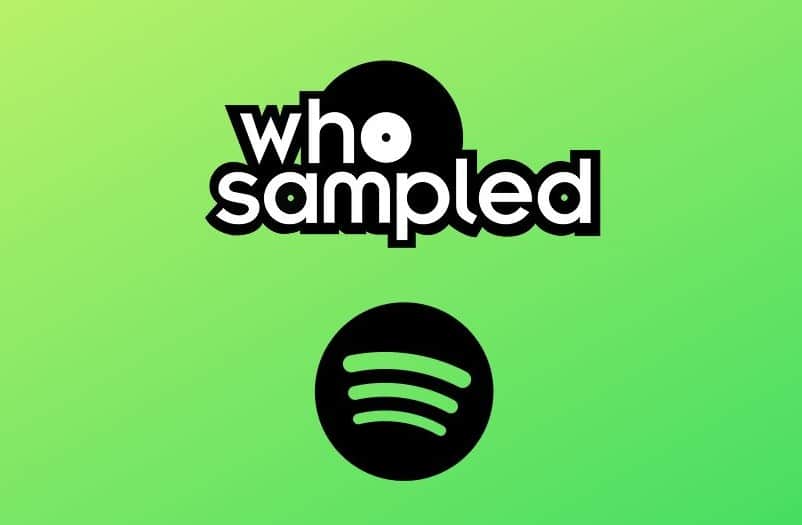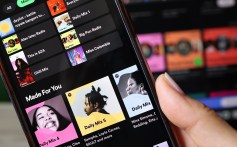spotify
Trending on Billboard Kelly Clarkson has officially joined Spotify’s Billions Club. The 43-year-old pop superstar and talk show host earned her place in the streaming service’s elite circle as her hit “Since U Been Gone” became her first song to surpass 1 billion streams on Spotify. The pop-rock anthem was released as the second single […]
Trending on Billboard Spotify will raise prices on its subscription plans in the U.S. in the first quarter of 2026, according to a Financial Times report that cited three people familiar with the matter. The article does not include specific information on the amounts of the price increases for Spotify’s various subscription plans. A Spotify […]
Trending on Billboard
Spotify’s stock price has fallen more than $200 below its all-time high of $785.00 set on June 27 after falling 8.2% to $583.62 in the week ended Friday (Nov. 21). The Swedish streaming giant’s share price dropped more than 7% in the two days after it announced the purchase of WhoSampled, an online song samples database, to power a new song credits feature, SongDNA.
Investors’ reaction to a relatively small acquisition appears to be part of a larger theme in recent weeks. While Spotify is one of the better-performing music stocks of 2025, it has struggled since the company announced on Sept. 30 that CEO Daniel Ek will step down and assume the role of executive chairman. Ek attempted to assuage investors who might be wary of his departure, saying in an open letter that “very little will change” when Spotify is led by co-CEOs Alex Norström and Gustav Söderström, two longtime Spotify executives. Ek added that he will operate with a European-style approach to the executive chairman position that is “more hands-on than the traditional U.S. model.”
Related
But investors aren’t showing much faith in the post-Ek era. Since the announcement, Spotify shares have fallen 19.9%, erasing $29.7 billion of market value.
Driven by Spotify’s 8.2% decline — the worst for all music companies this week — the Billboard Global Music Index (BGMI) fell 4.8% to 2,571.67. Eight of the index’s companies had gains while 11 finished the week with losses. The BGMI has not posted a gain in 10 weeks and now stands 17.5% below the all-time high of 3,117.20 set during the week of June 30.
Markets were down around the world this week. In the U.S., the Nasdaq fell 2.7% to 22,273.08 and the S&P 500 dropped 1.9% to 6,602.99. The U.K.’s FTSE 100 sank 1.6% to 9,539.71. South Korea’s KOSPI composite index and China’s Shanghai Composite Index each dropped 3.9%.
Warner Music Group (WMG) finished the week up 1.1% to $30.69. After releasing earnings on Thursday morning (Nov. 20), WMG shares dropped 2.7% on Thursday but gained 3.4% gain on Friday. Investors may not have received their desired message from WMG management, but analysts were upbeat about the numbers and management’s outlook. CFRA bumped WMG shares up to a “hold” rating from the “sell” rating it issued in July. Guggenheim kept its “buy” rating and $37 price target while noting that WMG’s “capital efficient” joint venture with Bain is likely to provide growth to both revenue and earnings. J.P. Morgan, which maintained its “overweight” rating and $40 price target, was “encouraged” by WMG management’s comments on margin expansion and market share gain.
Related
CTS Eventim shares rose 7.2% to 84.65 euros ($97.52). The German concert promoter and ticketing company released third-quarter earnings on Thursday that showed revenue rose 4%. The week’s gain brought CTS Eventim’s year-to-date gain to 0.8%.
Netease Cloud Music fell 7.1% to 189.40 HKD ($24.33) after its third-quarter earnings, released on Thursday, revealed a 2% decline in revenue. Cloud Music remains one of the year’s best-performing music stocks, however, with a 2025 gain of 68.8%.
Live Nation shares fell 3.9% to $130.55. Deutsche Bank lowered its price target to $160 from $173, which suggests 22.6% of upside based on Friday’s closing price, and maintained its “buy” rating.
The week’s greatest gainer was Cumulus Media, which rose 29% to $0.11. Such large swings are common for Cumulus, which has lost 85.7% of its value in 2025 and experiences sizable moves when it rises or falls a mere penny. With a market capitalization of just $2 million, the radio broadcaster has little effect on the BGMI.
Billboard.com
Billboard.com
Billboard.com

Robyn kick-started her one-off show at L.A.’s Fonda Theatre on Wednesday night with a supremely appropriate song choice: “Missing U.” After all, it’s been more than six years since the Swedish dance-pop icon mounted a full-length concert, so the 2018 Honey lead single’s lyrics “There’s this empty space you left behind” equally spoke to both […]
WhoSampled, perhaps not the most popular place for Hip-Hop producers who like to dig in the crates, is now joining the most popular streaming service globally, Spotify. According to a pair of blog posts from WhoSampled and Spotify, the sample source site will operate as it has before, with some functionality improvements and the empowerment of the streamer’s SongDNA feature.
In a blog post from Spotify, the impetus for the acquisition was made clear. The data from the sample source site will be used to empower the SongDNA feature, which will give an array of details about the artist and the track listeners are enjoying.
From Spotify:
We’ll also be rolling out SongDNA, an interactive view that maps out connections between songs, showing collaborators, samples, and covers all in one place. Spotify Premium listeners will see it in the ‘Now Playing’ view as a new way to explore, dig deeper into how tracks are connected, and trace a song’s creative roots. Samples and covers in SongDNA are powered by WhoSampled, which is now part of Spotify. With WhoSampled’s community-built knowledge, fans can dive into the influences behind the music they love, while giving sampled and covered artists fresh ways to get discovered and celebrated.
WhoSampled has enjoyed both success among users who enjoy learning more about the sources of their favorite songs, but the flipside is that some producers who rely heavily on sampling believe this could upend their creative aims.
The site explained in its own blog post that the site operates separately from Spotify, will have faster moderation, free apps across iOS and Android platforms, and the elimination of ads.
—
Photo: WhoSampled/Spotify

Trending on Billboard
Spotify has acquired the song sample platform WhoSampled, the companies revealed on Wednesday (Nov. 19).
According to a blog post by Spotify, WhoSampled will power SongDNA, an upcoming feature on the streaming platform that will showcase “connections between songs,” including samples, collaborators and covers. In a LinkedIn post, WhoSampled founder Nadav Poraz said he would stay on and that the platform would “continue to operate as a standalone platform and brand” following the acquisition. A blog post by WhoSampled added that the platform, which is driven by user contributions, would improve in several ways, noting that its iOS app would now be free to download and that in-app subscriptions would become free for all users; in addition, the site will become ad-free, and moderation for submissions will be faster.
Related
News of the purchase was part of a larger announcement in which Spotify revealed it would be expanding its song credits feature to encompass every single contributor to tracks on the platform; song credits previously only included topline performers, songwriters and producers. Spotify notes that the expanded song credits, which come directly from labels and distributors, are available starting now on the Spotify mobile app and will be rolled out to its desktop platform in the coming months.
Also announced by Spotify on Wednesday was “About the song,” another upcoming feature that will take the form of “swipeable cards” featuring factoids about songs. The information, which will be available in the platform’s “Now Playing” view, will be “sourced from third parties to highlight interesting details and behind-the-scenes moments,” according to Spotify’s blog post.
Spotify says the SongDNA and About the song features will be introduced via its Spotify for Artists platform early next year — giving creators an opportunity to offer feedback and “redeliver” credits if inaccuracies are found — before rolling out to users.
Related
“Every song is a collaboration, and every contributor should be seen,” said Jacqueline Ankner, head of songwriter & publisher partnerships at Spotify, in a statement. “With expanded Song Credits, SongDNA, and About the song, we’re giving fans a deeper look at the people and creative threads behind the music they love and giving creators the recognition they deserve. It’s another step in Spotify’s work to champion the people, connections, and stories that bring every track to life.”
Artists can review their Spotify song credits here.
Trending on Billboard
The Kid LAROI has seen the world, and, at times, owned it with a string of chart hits, awards and records smashed. On Monday night, Nov. 17, the inner-Sydney raised, Los Angles-based singer returned home in triumphant fashion for a secret gig, a launch pad for ARIAs Week.
Performing with a four-piece backing band, and wearing an all-black ensemble, including a black tie and leather jacket, LAROI is grateful and in a soulful mood, laughing at times as he slides through a mid-tempo collection of songs.
Related
Gone are the hoodies, baggies and the floppy blonde locks. This 22-year-old is all grown up.
SYDNEY, AUSTRALIA – NOVEMBER 17: The Kid LAROI performs onstage the Spotify Artist Party at Cell Block Theatre on November 17, 2025 in Sydney, Australia. (Photo by Hanna Lassen/Getty Images for Spotify)
Getty Images for Spotify
“It’s been a crazy last year. I don’t know how to process it still,” he tells the gathering at Cell Block Theatre in Darlinghurst, where the likes of Ninajirachi, Baker Boy and members of the Wiggles watch on.
When he last time performed on home soil, exactly a year ago, LAROI played arenas for his The First Time tour, and at Accor Stadium, for the NRL Grand Final. On Monday, for this inaugural Spotify Artist Party, LAROI played to a space smaller than some of the L.A. parties he attends.
ARIAs Week is always a special time of year. The Australian sun is typically baking in mid-to-late November, the holiday period is closing in, and the ARIA Awards, the national recording industry’s flagship event, is the crescendo for the year in music.
Homegrown stars Dom Dolla, Missy Higgins, Amy Shark and many more will stroll the red carpet, and brave the heat, alongside internationals Kacey Musgraves and Olivia Dean.
LAROI won’t be there. He bailed for a flight early Tuesday. The Kid admittedly has work to do setting up his next record, but he played his part in this annual celebration of Aussie music.
Spotify wants in, too. 2025 marks the first in the streaming giant’s three-year partnership with the ARIA Awards, and comes at a time when domestic artists are struggling to impact the national charts, the official singles tally in particular.
According to data supplied by Spotify, this campaign has already driven hundreds of thousands of additional streams for ARIA-nominated artists, and included 800-plus “high-impact” placements across Australia and key global markets, including the United States, United Kingdom, Korea and Japan.
Ahead of the big show, more than 250,000 Australians have already cast votes in-app for the public-voted categories, including best music festival, a new category. That result is said to surpass total engagement for the past two years combined.
Billboard caught up with Joe Hadley, Spotify’s global head of music partnerships & audience, to peel back the layers on the ARIAs collaboration.
Picasa
Billboard: Let’s talk about the three-year partnership, how that came about and why?
Joe Hadley: If you were to just zoom out and look at our partnership strategy as a whole, we really want to show up as a company where culture is happening, in a way that we can be supportive of both the industry and the artists.
When we were looking at the ARIAs, it was a no-brainer to show up here for this community.
It’s not about sponsoring an event. It’s about creating something together with the artists and the labels and our partners to build long-lasting impact.
You worked closely with the Music Awards Japan. Were there any lessons to learn from that?
That was a little bit different. It was the first year that something like that had happened in Japan. It was an incredible moment, so we were really in it with them from the beginning, to build something special. The ARIAs are long-established. We wanted to make sure that if we were to partner, we could amplify and take a national event and make it truly global, so we’ve worked really hard in partnership with the ARIA to do that. One thing you’ll hear me keep repeating through this is we’re taking something that has been a truly incredible national event and helping to globalize it.
Spotify is traditionally looked at as a digital company. We wanted too show up in real life in places where it matters, so seeing the artist-facing billboards in-person adds another layer of realness, to what we’re doing. But then having the event, the party with some incredible performances, that was also a key part of bringing this all together.
Do you have any takeaways from the ARIAs’ in-app voting?
What I think is more interesting is that the last couple of years, the most voted-for category has been international artist of the year, and with this shift to in-app voting on Spotify, that’s now changed to song of the year, which is obviously local artists. Which is a really incredible moment for us in the ARIAs to really push local music.
Is Australian music having a moment, or is it anywhere near having a moment?
Australian music is always having a moment. Dance and electronic music is leading the global breakthrough story. Dom Dollar, FISHER, Ninajirachi are in that genre and it’s having a real explosive moment right now.
Trending on Billboard
Dom Dolla will cash-in at the ARIA Awards on Wednesday, No. 19 in Sydney, where he scores another piece of history with the inaugural global impact honor.
If there was an award for stamina, he’d win that too.
Explore
See latest videos, charts and news
After another massive, record-busting run of live shows, awards and bucket-list releases, Dom finds himself at the table of the biggest electronic music artists, anywhere.
“My head’s definitely spinning a bit, but I’m having so much fun along the way,” Dolla (real name: Dom Matheson) tells Billboard. “I feel really lucky to be able to try new things creatively and share those moments with everyone who’s been along for the ride. I think if I didn’t genuinely love the process, none of this would be possible. I try to stay surrounded by like-minded people and other creatives who push you in the right ways .“
It’s been some ride.
As last year came to a close, he completed a four-date tour of Australia’s open-air venues, shifting 170,000 tickets en route to setting a new mark for a local electronic music artist.
And in the final stretch of this year, on Dec. 20, he’ll achieve another dream when he plays at Sydney’s Allianz Stadium, becoming the first DJ to do.
Along the circuit, he played sellouts at MSG; released his first soundtrack anthem, with “No Room For a Saint” from F1: The Movie; completed residences in Ibiza and Las Vegas; earned a Grammy Award nomination for his remix of Gorillaz’s featuring Tame Impala & Bootie Brown’s “New Gold”; lorded over some of the world’s best-known festivals, and much more.
With at least one guaranteed award at the 39th annual ARIA Awards, Dom can boast an ARIAs three-peat. He’s the two-time reigning champion in the category for best dance/electronic release with “Rhyme Dust” (with MK) in 2023, and “Saving Up” in 2024. He also won for “San Frandisco” in 2020.
There’s a good chance Dom will fill his boots. He has seven more ARIA Award nominations, behind only Ninajirachi with eight.
Announced Monday, Nov. 17 the ARIA Global Impact Award recognizes homegrown recording artists who have “demonstrated outstanding breakthrough international success and cultural influence,” according to a statement from ARIA, and celebrates Australia’s standouts through artistry, innovation, and global connection in the 12 months leading up to the big night.
“I was honestly shocked,” he says of the latest ARIA honor, and being the first tapped to win it. “It felt a bit surreal. But I really love this award for what I think it stands for – representing Australian music, and especially Aussie dance music, on the global stage. There are so many incredible artists from past years who would’ve deserved this, and so many who’ll keep flying the flag in the future. So to be the first is really special and I can’t wait to see who picks it up in the years to come.”
The ARIA Global Impact Award presented by Spotify will be handed out during the 2025 ARIA Awards ceremony, which is presented at the Hordern Pavilion and streams live from 5 p.m. AEDT on Nov. 19 via Paramount+, with additional coverage across ARIA’s official social channels.
Trending on Billboard
Spotify launched its first Artist Party in Sydney on Monday night (Nov. 17) featuring The Kid LAROI, marking the start of ARIA Week with a tightly programmed event centered on Australian talent ahead of the 2025 ARIA Awards.
Held at the Cell Block Theatre in Darlinghurst, the event functioned as Spotify’s primary on-the-ground activation during ARIA Week and drew a cross-section of nominated artists, emerging acts and industry figures. The Kid LAROI headlined the night with a short set that included a surprise appearance by Western Sydney drill group ONEFOUR for “Distant Strangers.” The performance marked a rare public pairing for the two acts in the lead-up to this year’s ceremony.
Related
LAROI, who has been home in Australia ahead of his next release cycle, addressed the crowd briefly, noting the significance of performing in Sydney during ARIA Week. The Kid LAROI said: “I grew up dreaming about nights like this, so to be back in Sydney, performing this party with Spotify and surrounded by so many Aussie artists I respect, is special.”
He added, “Australian music is having a massive global moment right now, it’s so cool to be part of that!”
Several 2025 ARIA nominees also appeared on the bill. Sons of the East (Best Blues & Roots Album) and Taylor Moss (Best Country Album) delivered unannounced acoustic performances, while Young Franco — nominated for Best Solo Artist and Michael Gudinski Breakthrough Artist — closed the night with a DJ set.
The event drew notable nominees, including Ninajirachi, this year’s most-nominated artist, as well as RedHook and Larissa Lambert. Members of The Wiggles were also seen in attendance, reflecting the wide footprint of ARIA Week programming across genres and generations.
This year’s ARIA Awards arrive with higher-than-usual audience participation following the introduction of Spotify’s in-app voting tool, which the ARIAs say has driven more than 250,000 public votes across the ceremony’s open categories. That figure surpasses combined tallies from the previous two years and indicates elevated visibility for this year’s broadcast and livestream.
The 2025 ARIA Awards will be held Nov. 19 at Sydney’s Hordern Pavilion, streaming live on Paramount+ from 5 p.m. AEDT before airing later that night on Network 10.
Trending on Billboard
On Thursday (Nov. 13), Spotify launched a new tier of its subscription service, Premium Platinum, in India, Indonesia, South Africa, Saudi Arabia and the United Arab Emirates.
Related
The Premium Platinum plan takes the place of Premium Family plans for new subscribers in these markets. Spotify support page in India, for example, notes that the multi-user Premium Family plan “is only available for users that signed up for Premium Family before November 13th, 2025.” (Support pages for the other four markets do not have the same declaration, but Premium Family is no longer listed as an available option for new subscribers on the other countries’ Spotify websites.) A Premium Platinum account can be shared by up to three people, while a Premium Family account can be shared by up to six people.
Premium Platinum includes lossless audio quality (up to 24-bit/44.1kHz), which began rolling out as a standard feature in 50 markets, including the U.S. and U.K., in September. Other features include the ability to mix playlists, a personal AI DJ, AI playlist creation, the ability to connect to DJ software, and, in some markets, audiobook listening.
The prices for Premium Platinum range from 50% to 89% more than Premium Standard. In India, Premium Platinum costs 299 rupees ($3.37) per month, 50% more than Premium Standard’s 199 rupees ($2.29) price tag. In South Africa, Premium Platinum costs 179.99 rand ($10.55) per month, 89% more than Premium Standard’s 94.99 rand ($5.57) price. Platinum includes audiobook listening time in South Africa.
Related
Spotify offers the same suite of Premium tiers in each of the five markets: The affordable Premium Student, the low-priced Premium Lite, the Premium Standard, and the more expensive Premium Platinum. Features are doled out according to price. Premium Platinum offers the most features and carries the highest price. Premium Lite has the lowest audio quality (up to 160kbps) and does not allow for offline listening to downloaded files. Premium Student and Premium Standard have better audio quality (up to 320kbps) and offer the ability to download files for offline listening.
What Premium Platinum does not include is the kind of “superfan” features that have been discussed by Spotify and record label executives. During Universal Music Group’s Oct. 30 earnings call, CEO Lucian Grainge discussed AI-driven tools that could “revolutionize” how fans interact with music, such as a “sophisticated, highly personalized chatbot.” And earlier on Thursday, Spotify CFO Christian Luiga mentioned “mixing tools” when discussing ways Spotify increases engagement while speaking at the Morgan Stanley European Technology, Media and Telecom Conference.

 State Champ Radio
State Champ Radio 






